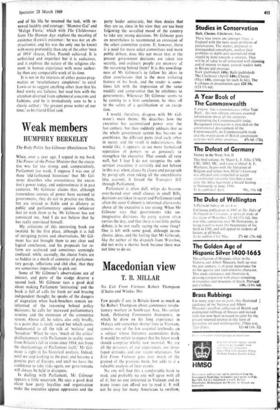Weak members
HUMPHRY BERKELEY
The Body Politic Ian Gilmour (Hutchinson 70s) When, over a year ago, I argued in my book The Power of the Prime Minister that the execu- tive was far too strong, and, comparatively, Parliament too weak, I suppose I was one of those 'old-fashioned historians' that Mr Gil- mour describes who overestimate the execu- tive's power today, and underestimate it in past centuries. Mr Gilmour claims that, although
tremendous sources of power have accrued to governments, they do not in practice use them, but are instead as fickle and as dilatory as Public and parliamentary opinion (whatever that is) wish them to be. Mr Gilmour has not convinced me. And I do not believe that he has really convinced himself.
My criticisms of this interesting book are twofold. In the first place, although it is full of intriguing points and observations, Mr Gil- mour has not brought them to any clear and logical conclusion, and his proposals for re- form are scattered and sometimes seemingly confused; while, secondly, the choice fruits are so hidden in a mush of centuries of parliamen- tary gossip, reflections and chit chat, that they are sometimes impossible to pick out.
Some of Mr Gilmour's observations are of interest, and parts of the stodge deserve a second look. Mr Gilmour says a good deal about making Parliament 'interesting' and the book is full of calls for fresh air'and bracing independent thought; he speaks of the dangers of stagnation when back-benchers remain un- informed of the reasoning behind policy decisions; he calls for increased parliamentary scrutiny and the extension of the committee system. Above all, he refers, alas only briefly, to a point that is rarely raised but which seems fundamental to all the talk of 'malaise' and `boredom.' When he says, 'much of the critics' disillusionment with Parliament in reality stems from Britain's fall in status since 1914, not from the shortcomings of Parliament itself,' Mr Gil- mour is right in his historical analysis. Indeed, until we stop looking to the past, and become a genuine part of Europe, and until we have the confidence to take risks again, our governments will always be held in disrepute.
In dealing with Parliament, Mr Gilmour appears a little uncertain. He says a good deal about how party loyalties and organisation make the executive appear oppressive and the
party leader autocratic, but then denies that they are so, since in his view they are too busy following the so-called mood of the country to take any strong decisions. Mr Gilmour goes on nevertheless to recommend an extension of
the select committee system. If, however, there is a need for more select committees and more public debate, does this not mean that at the present government decisions are taken too secretly, and ordinary people are unaware of the reasoning behind them? It is this unwilling- ness of Mr Gilmour's to follow his ideas to clear conclusions that is the most irritating feature of his book, and the reader is some- times left with the impression of the same muddle and compromise that he attributes to governments. Whenever Mr Gilmour seems to be coming to a firm conclusion, he shies off to the safety of a qualification or an excep- tion.
I would, therefore, disagree with Mr Gil- mour's main theme. He describes how the executive has accumulated power over the last century, but then suddenly adduces that as the whole government system has become so overblown, the different parts rival each other in secret, and the result is indecisiveness. He would like, it appears. to see more formalised separation of powers so as genuinely to strengthen the executive. That sounds all very well, but I fear I do not recognise the sub- servient executive; it certainly did not behave in this way when, clause by clause and paragraph by paragraph, even taking all the amendments into account, it forced the Transport Bill through Parliament.
Parliament is often dull, whips do become over-heated over small clauses in small Bills, decisions are taken in secret and Parliament (and often the outer Cabinet) is informed afterwards; above all the executive is too strong. When Mr Gilmour says that governments take un- imaginative decisions, the party system often carries the day, and that there is too little public debate, is he not really saying the same thing? One is left with some good, although incon- clusive, ideas, and the feeling that Mr Gilmour. like the author of the dispatch from Waterloo, did not write a shorter book because there was not time to do so.


































 Previous page
Previous page